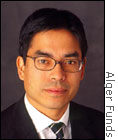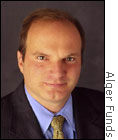NEW YORK (CNN/Money) -
A year after the unthinkable happened at Alger Funds, life goes on.
There is a new team of managers and analysts picking stocks for Alger LargeCap Growth and Alger Capital Appreciation. There are new offices on the second floor of a modest building in the Flatiron district in Manhattan.
Still, you wonder how they were able to start anew, after a plane slammed into Tower One of the World Trade Center that crisp September morning, killing star fund manager David Alger and 35 staffers.
"There's not anyone here who's not deeply motivated to honor the memory of David and the rest of our staff by performing well," said Dan Chung, the firm's chief investment officer. "It's made us even more motivated."
A terrible milestone looms
 |
|
| Dan Chung |
The firm understandably doesn't want attention on this sad anniversary. Fred Alger, David Alger's older brother, who founded the company in 1964 and came back from retirement to help rebuild it, declined comment. Chung, 40, was guarded at the start of a recent interview alongside vice chairman Jim Connelly in a hushed conference room at their new headquarters. Together, they represent the future of Fred Alger Management -- Chung in charge of investments, Connelly, 39, heading business operations.
"At 10:30 a.m. on Sept. 11, the whole firm was up and running in our backup office in Morristown," Connelly said. (Chung and Connelly were both out of the office that day -- Chung was at a meeting in midtown Manhattan and Connelly was taking his daughter to the doctor.)
The firm swiftly hired back six former analysts and two former fund managers who had worked for Alger in the past. Each had about 15 years of experience and knew how Alger operated.
 |
|
| Jim Connelly |
The market hasn't made their job easy, however -- especially when they have to live up to David Alger's record. He was one of the top-performing growth managers of the 1990s, earning an annualized return of 29 percent for Spectra, according to Morningstar. He was also mentor to many of the fund industry's biggest stars, including Tom Marsico of Marsico Funds as well as Helen Young Hayes and Warren Lammert of Janus.
While growth funds are struggling this year, Alger funds are all in the middle or bottom of their categories. The funds' three-year and five-year records have also suffered, except for MidCap Growth, which is still near the top of its category. Spectra, too, is ranked first in its category over 10 years.
"I'm not happy with the returns. No one is happy being average -- they want to be No. 1," said Chung, who manages MidCap Growth. "But you get there by focusing on what lies ahead."
Following in the footsteps of a legend
Chung has big shoes to fill, but his pedigree is no less impressive than David Alger's. (Click here for a 2000 profile of David Alger). A graduate of Stanford University and Harvard Law School, Magna Cum Laude, he was a clerk for U.S. Supreme Court Justice Anthony Kennedy before moving into business. He joined Fred Alger Management in 1994, rising from a junior analyst to overseeing coverage of the tech sector before his latest promotion last September. (He is also Fred Alger's son-in-law.)
| * Note: An 80% category ranking means 80% of comparable funds are performing better | | Source: Morningstar (Data as of 8/26/02) |
|
You can see the lawyer at work as Chung talks about the market -- explaining macro trends, citing facts and figures as if he's arguing a case. GDP growth is strong, inflation remains low, consumer spending is hanging on. Unemployment, though higher today than a year ago, is still historically low. Corporate earnings are strengthening.
In the last quarter of 2001, Chung gave the portfolios a more aggressive edge, increasing the weightings in technology to 18 to 20 percent, nearly double the level before the attacks. He also boosted weightings in consumer/discretionary stocks, such as retailers, hotels and casinos, betting that the economy would turn around.
"We correctly anticipated the economy would recover," Chung said. "Despite the doom and gloom, the economy is growing."
A cautious green light
Clearly, a year isn't enough time to tell whether or not the firm's restructuring will be successful. But analysts seem to be cautiously giving the team the benefit of the doubt. The mutual funds newsletter FundsNet Insight recently removed its "sell" rating from Spectra, impressed at how the firm rebuilt. "Granted, the fund has had a tough year," said editor John Bonnanzio. "But long term, the fund should do well because they have good management in place."
| |
 Related stories and tools:
Related stories and tools:
| |
| | |
| | |
|
Indeed, the word on the street in those early chaotic days was that Fred Alger would shutter the firm. Some institutional clients pulled money out. AOL Time Warner -- parent of CNN/Money -- halted contributions to the $10 million in employee 401(k) assets managed by Alger. But since then the company has gained back all but one client -- Commonfund, a non-profit institutional money manager based in Connecticut. Alger has since added six new clients, including the New Orleans firefighters pension, America West and ING Aetna, Connelly said.
Assets stood at $13 billion before the attacks. Now, they are slightly above $10 billion.
"It's remarkable we're even talking about Alger Funds," said Roy Weitz, editor of Fundalarm.com, a site that tracks mutual funds. "A year ago, you would have had a lot of bets that they wouldn't even be around. They deserve a tremendous amount of credit and admiration."
Another client, American Skandia, an investment firm in Connecticut with $30 billion in management, is also putting its faith with the new management, despite initial concerns, said Michael Murray, senior vice president. At the time, Alger managed $800 million in ASAF Alger All-Cap Growth and AST Alger All-Cap Growth. After 9/11, just to be safe, American Skandia added a second manager, MFS. But Fred Alger Management assumed full control by the end of the year.
"We were concerned not only for the loss of life, but how the firm might be affected," Murray said. "This sounds mercenary and heartless, but it's a better firm today than it was on Sept. 10. Their management is more focused. They have a lot more to prove."

|

